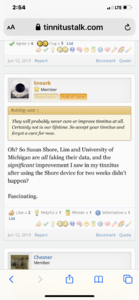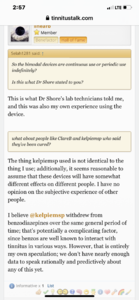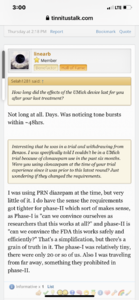Good lord, what happened to this thread? How did UMich go from being seen as one of the bimodal pioneers to suddenly being treated with.... suspicion, and viewed as illegitimate?
I realize that cynicism and pessimism can go hand in hand with tinnitus, but where are some of these insane ideas even coming from?
Please stop commenting on this thread. Whether or not timing is effective no device will ever be made from this "Work". We should all move our focus to groups who don't waste time and thus are more likely produce.
what are you smoking, and where can I get some? This group has produced the research that bimodal stim is based on, as well as performing the first bimodal trials for tinnitus on humans in the US. This is one of the
only groups in the world that are actually "doing something".
She won't. My bet is the University will likely look for someone to license the tech to that will commercialize it. Notice on the last page "Product Launch Strategy - To be determined by licensee". Commercializing and manufacturing a product requires a completely different skill set than getting something through trials.
this is true, but as has been said many, many times a medical device manufacturer has already had contracts executed and the same company which built the prototype devices used in the trial, will produce commercial units once FDA clearance happens. I don't remember the name of the company off hand, but it's not secret, and I'm pretty sure you'd find if if you mined my posts here.
Can someone who is following this thread well answer the following:
1. Do we have testimonials of people getting noteworthy reductions from this device and other evidences? and how much failed?
2. When would it be released to the market?
Read the thread, read the thread, read the thread. Yes to #1, I am one of them, and we've got at least one other person who was in a similar trial at the University of Minnisota who said the same, and last I heard we had a couple people who might be in the current UMich trial, but I haven't been following the thread. I just opened it today and it seems to be pages of people projecting doom-and-gloom for basically no reason that I'm aware of.
I have stayed loosely in touch with the lab since I was a lab rat 4 years ago, and they have given me the
same story all along: Phase-II ongoing with
potential market as early as 2020, but that involves a lot of things going very right and getting FDA clearance before all trials complete. As early as ~2014, they were telling me that a launch window was "probably 2020-2024", and I don't see anything that's materially changed that?
Susan Shore... when the hell is she going to commercialize her device.
Uh... do you have a general understanding of the path for getting a new medical device from "idea" to "prototype" to "FDA paperwork" to "commercial device" to "commercial device that insurers will pay for"? If anything this is moving
very fast compared to how long it would take a drug to go from idea to market.
tl;dr UMich told me in 2014 they expected to have something on the market "between 2020 and 2024", they were up front at
that time that 2020 was a stretch goal based on being able to clear FDA before all trials completed, and this is the same basic information they're projecting today. So, they seem to be very consistent to me, they've published more actual RCTs on this than Neuromod (and much more recently), and the only thing that seems inconsistent is whether this thread is treating Shore as the second coming of Jesus or a laughingstock, which seems to vary day to day for reasons I am very unclear on.

 Member
Member

